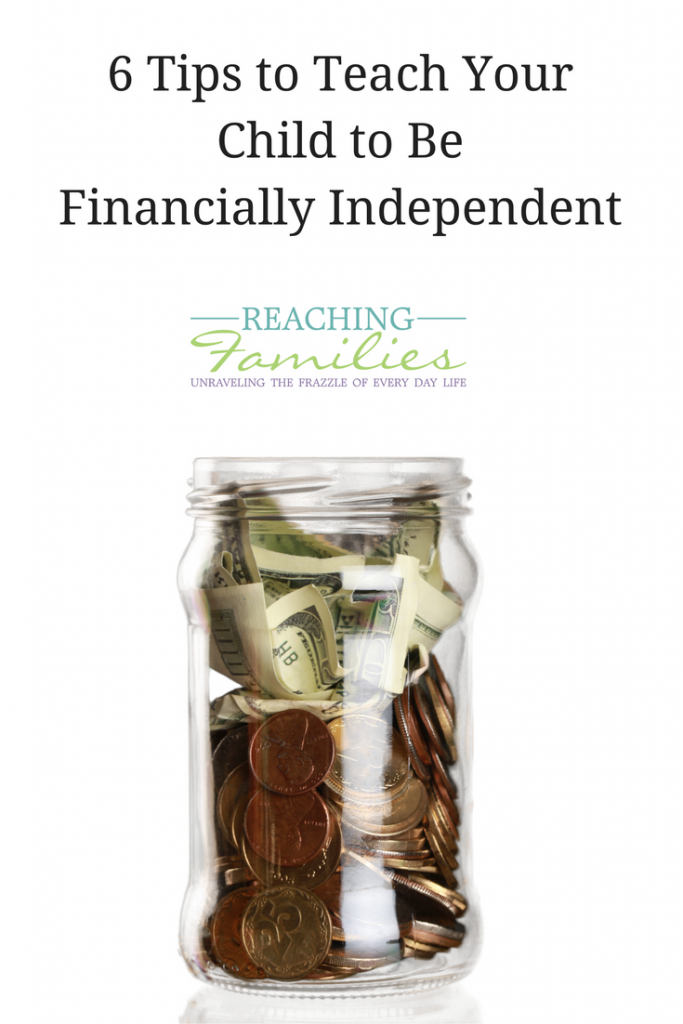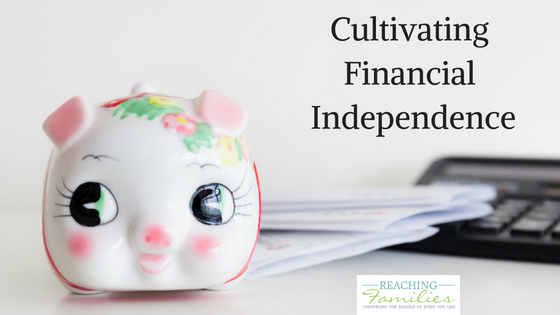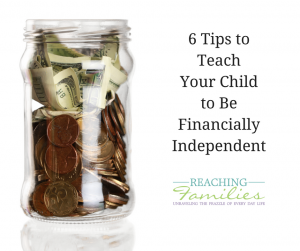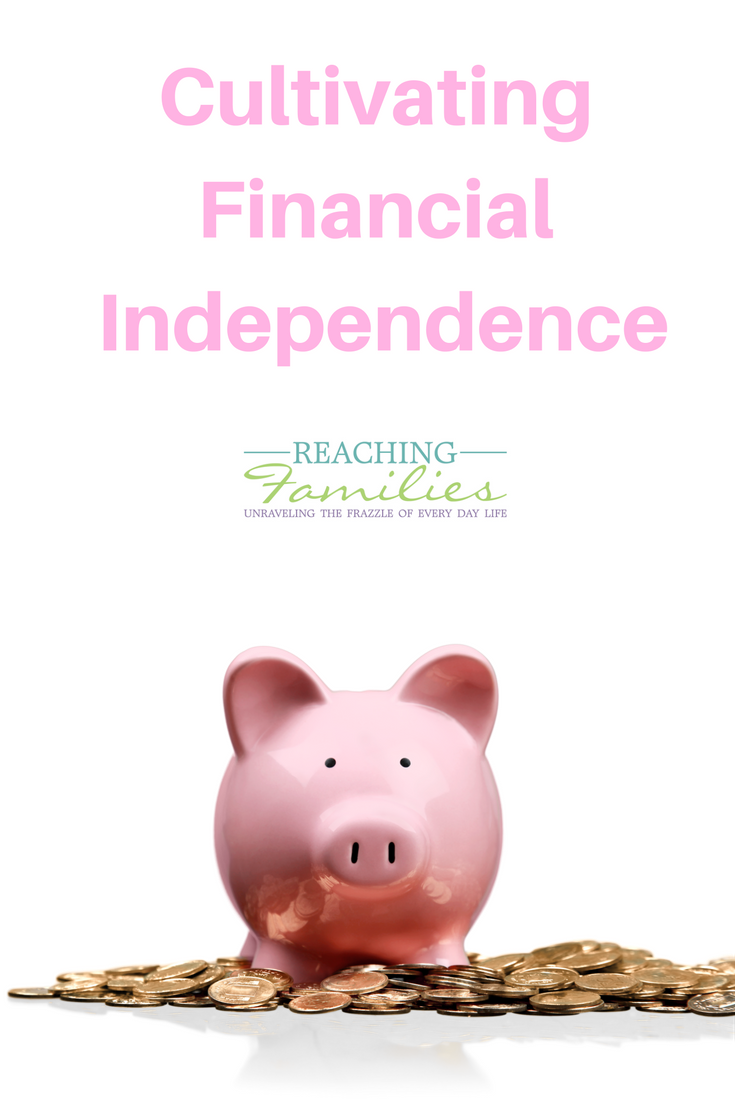Financial Independence
Financial Independence is so a key ingredient for adult life. The importance of teaching finances to our children determines their independence. If they do not know how to manage their finances they will be dependent for a very long time. Start early. I remember we had little banks that we used at a young age. They were able to separate their allowance and any gift money to begin saving. Our children had bank accounts by the time they were each 16. Keep up with teaching the newest technology and how to manage financial independence in our ever-growing world of technology.
I have a friend who I have asked to share from her life experiences of striving for debt free living. I have watched her grow up and become an encouragement to many people with her awesome tips and ideas. Here are her 6 tips to teach financial independence.
6 Tips to Teach Your Child to Be Financially Independent
Guest Post by Tshanina from Thrifty Ts Treasures
While I may only be the mother of a toddler, I’ll be the first to admit that parenting is hard work! There’s so much we need to teach our children while they’re under our care, and for many the thought of teaching your child how to be wise with finances is a bit overwhelming.
Now you may be wondering why in the world you should listen to me, a stranger, when it comes to finances. Well, some may call me a numbers nerd. In fact, a few of my close friends have even gave me the nickname of Thrifty T. I started budgeting at the age of 15 and saved enough to pay my way through cosmetology school. As an adult I’ve faced both lean financial years when I had to say no to simple things like going out with friends for dinner and much easier years when I had more breathing room. My husband and I live debt free and were very humbled a few years ago when we were able to pay off our mortgage.
I’ve made my fair share of mistakes with money but would like to think I’ve learned some valuable lessons from them. Here are the best tips and tricks I’ve learned through the years. I pray they’ll help you as you teach your child to be financial independence.
Spend, Give AND Save
It’s no secret that we don’t have to teach our children how to spend money. If your child is like most, one trip to the store and he’ll find a treasure he can’t live without…and his money will be gone!
Since he already knows how to spend, teaching him how to give and save is the next step in learning about money. I recommend teaching him as early as possible so he can get in the habit of all three and it feels like second nature to him. As he gets older and earns more money he’ll already have the mindset to spend, give and save.
Whether you create fun coin purses, buy him a money bank or make something else, just start with something and have fun with the process. Each time he gets money and puts it in his bank, talk to him about the importance of spending, giving and saving. Let him choose what he’s going to save for and where to give.
As he gets older and moves into the teenager years figure out how he is wired – he may enjoy creating a simple budget on paper or a spreadsheet may work better for his personality. And when you feel he’s ready, help him open his very own bank account so he can learn to be responsible with his money.
Choose Contentment
One look around and you can see that we live in a consumer based society. I like to call it the drive-thru society – we see a shiny new thing, decide we want it, buy it and charge it without thinking of the repercussions. Gone are the days of being patient and waiting (and saving) for that special thing that we so desperately want. It’s heartbreaking to see families live beyond their means and struggle year after year. If they would only choose to be content with what they have they could pay off their debts, live a freer life and give generously.
Why do I say all this? Because it starts in the early years. Growing up my family didn’t have much, but we had everything that we needed. And guess what? I didn’t know any different until I was older and out on my own. We didn’t go on luxurious vacations or drive fancy cars but there was always food on the table and clean clothes on our back.
Start now by teaching your child how to be content with what he has. If he can’t learn to be content with what he’s been given right now, how will he be content when he has more?
Pay With Cash
It’s a proven fact that when we pay with cash we spend less. Handing over cash at the store is much harder than swiping a card. (If you don’t believe me, just try it yourself!)
While it’s not very likely that your child will be paying with a card, he’ll quickly learn how attached he is to his cash when it comes time to pay for things. Plus, it will help him with his math when he’s learning to count out change.
Mistakes Are Normal
We’re all human and are going to make mistakes…especially with our finances. The key to success with financial mistakes is learning from them. When your child makes a mistake (and he will) kindly talk with him about what happened and what he could have changed to make a better choice.
Live Within Your Means
We’ve already touched on this a bit but the thought of living within our means is a hard concept for most Americans. It can be difficult to live within your means and see friends/family buying whatever they want. Earlier I told you that there was a time when I couldn’t even go out to dinner with friends. I remember only being able to put a certain amount of gas in my car or having to take things out of my buggy at the grocery store and put it back on the shelf because I didn’t have the money. Those were some hard years but I learned so much from living paycheck-to-paycheck just to make ends meet. Living within your means is hard but definitely worth it not to have a huge pile of debt staring you in the face every day!
As your child moves into the teen years he’ll need to learn that he might not be able to buy that shiny new piece of electronics that he’s been eyeing because he needs to put gas in his car. You may only have $50 to put towards a new pair of shoes for him. He wants the $150 pair of shoes – let him pay the remainder. As he saves for those shoes, he may realize that it’s not worth all that work and change his mind.
Hard Work Pays Off
It’s never too early to teach your child the value of hard work. Learning how to be a hard worker may start as a child, but it carries into the teenage years and even adulthood.
My teenage nephew was hired on at our local greenhouse/nursery for one summer. When they saw what a hard worker he was, they kept him on through the winter. My nephew decided to move on to another job, and the manager at the greenhouse told him he’d always have a job available there.
Employers are always looking for hard workers that won’t slack off and be lazy. When an employer hears that your child is a hard worker, he’ll want to scoop him up and keep him. The characteristic of being hard working carries on into adulthood and that’s definitely a reputation that we’d all like to have!
Be Their Example
Above all, I want to encourage you to be their example! I have no doubt that this is the most important step in teaching your kids how to be financially independent and eventually responsible adults. Kids are much smarter than we give them credit for and they are constantly watching what we’re doing.
I worked with teenagers for over 10 years and learned that they crave authenticity. Although they might not admit it to you, they want you to be their parent and not their friend. Talk with them about the mistakes you’ve made with your finances. They might be more prone to listen to you. Keep an open dialogue with them and be a safe place for them to come knowing that you’ll not only listen but give sound advice.
It may be the case that you’re not a very good example for your kids. Is it time for you to start a budget yourself? How to Start a Budget in 3 Easy Steps
Tshanina is a Homeschool Graduate, Wife, Mother and Blogger known as Thirfty T . She shares about her life journey over at Thrifty T’s Treasures
What are your best tips and tricks for teaching your child to be financial independent?









 </>
</>
Leave a Reply